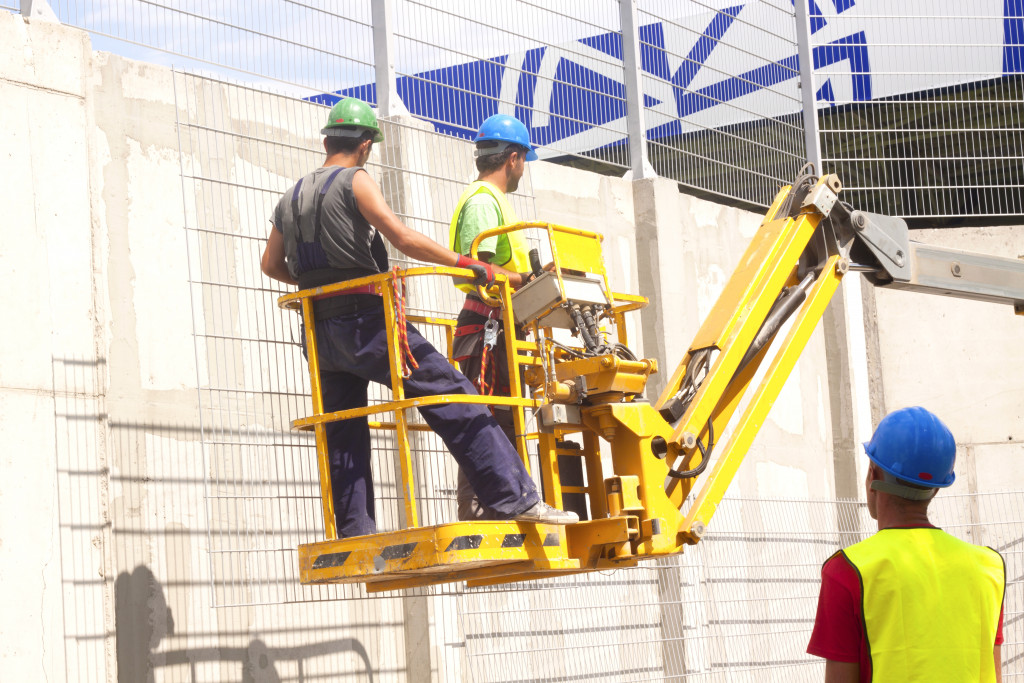- Develop a business plan to outline goals, target market, competition and financial projections.
- Establish a strong brand identity with a consistent logo, website and marketing materials.
- Build a network of industry contacts through events and conferences.
- Invest in quality equipment such as scissor lifts, cranes, excavators, bulldozers and welders.
- Hire and train skilled workers and provide ongoing training.
Starting a construction business can be both challenging and rewarding. As an aspiring entrepreneur, you must be prepared to face the unique challenges of this industry. Here are five tips to help you start a successful construction business.
1. Develop a Business Plan
Before you start your construction business, it’s important to have a well-thought-out business plan. This plan should include a detailed overview of your business goals, target market, competition, marketing strategy, financial projections, etc.
Your business plan should also include a clear understanding of the legal and regulatory requirements for starting a construction business in your area. This may include obtaining necessary licenses and permits, registering your business with the government, and complying with safety regulations.
2. Establish a Strong Brand Identity
Establishing a strong brand identity is crucial to the success of your construction business. Your brand identity should reflect your company’s values, vision, and mission. It should also be consistent across all marketing and advertising materials.
Create a professional logo, website, and marketing materials that reflect your brand identity. Consider working with a marketing or branding agency to help you develop a strong brand strategy.
3. Build a Strong Network
Building a strong network of industry professionals is essential for the success of your construction business. This network should include suppliers, contractors, architects, engineers, and other professionals in the construction industry.
Attend industry events and conferences to meet new contacts and establish relationships with key players in your industry. Consider joining industry associations and organizations to stay up-to-date on industry news and trends.
4. Invest in the Right Equipment
Investing in the right equipment is critical for the success of your construction business. This includes heavy machinery, tools, safety equipment, and more. Ensure that you have the necessary equipment to complete projects efficiently and safely.
Consider renting or leasing equipment to reduce initial costs. However, if you plan to use the equipment frequently, it may be more cost-effective to purchase it outright.
Here is some construction equipment to invest in:
Scissor Lifts
Scissor lifts are a must-have for any construction business. They provide the necessary accessibility and lift height to complete projects efficiently. Invest in high-quality scissor lift floor protection to ensure your workspace is safe and secure. Scissor lift diapers are designed to catch any fluid leaks that may occur during operation. They protect the floor and the lift, keeping your workspace clean and free of any potential hazards.
Cranes
Cranes are invaluable for large-scale projects, such as building bridges or multi-story structures. Investing in one (or more) will make your work easier and help you stay on schedule. Consider different crane types available, from mobile to tower cranes, to find the best fit for your needs.
Excavators
Excavators are used for a variety of tasks in construction, from excavation to demolition. Investing in an excavator that meets your needs and budget will ensure you stay productive. Make sure to consider the type of terrain the excavator will need to navigate as well as how much weight it can lift.
Bulldozers
A bulldozer is a heavy-duty machine for grading, leveling and clearing land. Investing in a quality bulldozer will save you time and effort on large jobs such as road construction or new home developments. Consider the job size when selecting a bulldozer to ensure it can handle the task.
Welders
Welders are used to join metal components together, making them an essential tool for many construction projects. Make sure to purchase high-quality welders designed for your specific needs, such as aluminum or arc welding. Investing in quality equipment will extend its lifespan and reduce repair costs. Investigate different models available to find one that best suits your needs. Additionally, you should seek certified welders with the right skills and experience to use the tools effectively. This will help ensure that all welding jobs are done correctly and safely.
5. Hire and Train Skilled Workers
Hiring and training skilled workers is crucial to the success of your construction business. Your team should include skilled tradespeople, project managers, and administrative staff.
Ensure your team is properly trained and certified to operate the equipment and tools on the job site. Offer ongoing training and development opportunities to help your team stay up-to-date on industry best practices.
In Summary
Starting a construction business can be a challenging but rewarding experience. By developing a business plan, establishing a strong brand identity, building a strong network, investing in the right equipment, and hiring and training skilled workers, you can set your construction business up for success. Remember to approach each step with careful consideration and attention to detail and to prioritize safety and quality in all aspects of your business.


